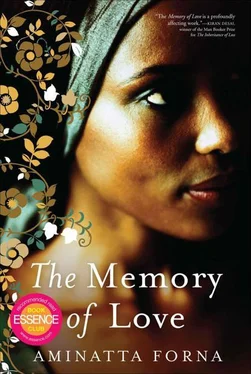‘No,’ says Adrian quickly. ‘God, no.’
‘What were you talking about?’
Though Adrian does not particularly wish to repeat Robert’s remark he does.
Mamakay sits in silence, not looking at him or apparently listening any longer, but staring at Robert, who in turn appears oblivious, his attention occupied by the girl who has now moved to stand in front of him, her legs straddling his knee, rotating her hips in time to the music. Mamakay jumps up and heads to the bathroom. Adrian sits and waits, drinks his beer, wonders how to bring back her mood. He spots her coming back from the bathroom. She smiles softly at him as she takes her seat. He is about to ask her if she is all right, when a disturbance at the bar draws his attention away. It is Robert, he appears to be involved in an argument. Adrian sees the girl who’d been stroking his thigh snatch up her handbag and stalk away. Mamakay is watching, too. When it is quiet again, she picks up her drink and takes a sip.
‘What was all that about?’ says Adrian.
‘While we were in the Ladies I told her what he’d said to you.’
It takes a moment for Adrian to absorb this. He looks sideways at Robert, but the aid worker has his back turned to them.
‘I see,’ says Adrian eventually.
Mamakay speaks again, more quietly this time.
‘I beg your pardon.’ Adrian bends in to hear her.
‘She was my classmate. We were at school together. Her name is Josephine.’
A residual memory of his thoughts when he first saw the girl in the purple top flushes Adrian with shame. When he looks at the bar, Robert is gone.
He did not come here expecting to find happiness.
In the evenings they go out, sometimes to old places, sometimes to new ones. He wants to know this city of hers, he wants to share her world. They eat together, at Mary’s or else buy food from the women who sell to working men from roadside stalls. Less often she cooks. She eats with her hands and laughs at his jokes; she can sometimes be outrageous and flamboyant in his company, as he, Adrian, is in hers. He barely recognises this part of himself, though it is not new, just forgotten. They make love often. Adrian does not know how he is capable, but he is, and still achieves new pleasure. It amazes him that she feels cold at night. She falls asleep, once during an embrace, her thighs either side of him, her upper body curled on his chest. He lies there for an hour, scarcely breathing, to allow her to sleep on. He looks at her, from this awkward angle, too close. Yet manages to memorise the configuration of every hair on her head. Once he dares to lift his hand and touch her hair. There are questions he wants to ask. How many lovers has she known? Who are they and what are their names? Who was the first and who the latest? Did she love any of them? He wants to ask, but he does not dare because he is afraid of what would happen once he began, because he knows he would never be able to stop.
An evening they are sitting up on the balcony upstairs. The occupant of the flat is away for a few days. They carry their beers up the outside stairs. ‘For a change of scenery,’ she says. ‘I’m tired of looking at concrete.’ There is a view of the roof of the house in front, of clusters of huts, panbodies as Adrian now knows them to be called.
A group of ragged children march across an open space, pushing one of their number ahead of them like a prisoner. One of them smacks the boy in front in the back and he staggers.
‘Hey!’ Mamakay is on her feet and shouting at the children, who stop and look up. One by one they drop their gaze and shuffle off.
‘You couldn’t do that in Britain.’
She sits down opposite him. ‘Is that so?’ She seems amused.
‘Yes,’ says Adrian. And then, ‘Did you have brothers and sisters?’
‘No,’ says Mamakay.
‘That’s unusual, isn’t it?’
She nods. ‘I don’t know why. I wanted a little brother, you know, like little girls do. I used to ask my mother. She never said no, and she never said yes. After a while I stopped. I must have changed my mind. So, no. No brothers or sisters.’
Adrian has yet to tell Mamakay about his relationship with her father. There is no genuine conflict of interest, he tells himself. Elias Cole is his patient, not Mamakay. And Elias Cole is not really a patient, not as such. It requires handling, though. In Britain his relationship with her would undoubtedly be viewed as problematic from a professional standpoint. This, though, is not Britain.
Something flies out of the darkness and drops into a pawpaw tree, the sound of its wings like a mainsheet loosed against the wind. The tree is the height of the balcony, the leaves almost within reach. Mamakay shines a torch into its recesses and they see a fruit bat. Adrian can hear the sucking sound as it eats the fruit, apparently undisturbed by their proximity. A second bat arrives and nestles into the same crevice. Adrian is unprepared for how black they are, an unreal blackness: wings, snouts, claws, as though all the darkness had gathered in this one living creature. He would like to draw them, but they only come after dark, says Mamakay. She fetches an oil lamp and sets it on the table between them. She sits with her heels resting on the lip of her chair, her arms across her knees, one hand holding her beer bottle. The light illuminates the planes of her face, the edges of her lips, the reflection of her eyes. He discovers she studied history at university, like her father.
‘Did you ever think about getting a position at the university?’
She replies, ‘I never finished my studies.’
‘Because of the war?’
‘In a manner of speaking.’ She stands up, changing the subject. ‘Are you hungry? I’m hungry. I need to eat. Let’s go out.’ Suddenly she is no longer relaxed but restless.
‘Sure,’ says Adrian, who has yet to deny her anything.
When he is away from her, he tries to conjure up her face. He closes his eyes, but the magic eludes him. When they are together he watches, learning her features, her gestures. Still, afterwards, he cannot make it happen. It is as though when she goes she takes everything of herself with her.
He realises too that she asks him almost nothing about himself, not even when they will next meet. In those moments they are together, she gives him her attention entirely; by the same token he draws none of her curiosity. It bothers him. As he watches her lying with her back to him, a memory of the night at the bar: the girl with the purple top arrives, skewed and bent out of shape, moulded into something else. The paranoia of a man newly in love. She senses something because she rolls over to look at him, frowns slightly. ‘What is it?’
‘Have you done this many times before?’ he asks.
She raises herself up on one elbow and traces his Adam’s apple lightly with her forefinger. He is afraid to ask. She removes her finger and says, ‘What are you asking me?’
He can barely breathe: ‘Have you done this before?’
She is gazing at the ceiling, an arm extended, drawing circles with her index finger in the air. To Adrian there is something mesmeric about that finger, as it passes in and out of the shadows cast by the moon.
‘No,’ she replies.
The relief is so immense his bowels turn to water.
Still tracing patterns on the ceiling, she continues, ‘Have you?’
‘No,’ replies Adrian.
She says, ‘Fine, then.’ And rolls over with her back to him once more. His relief disappears.
‘You make me happy,’ he says to her back.
‘Good,’ she replies to the wall.
‘And it frightens me.’
She turns to face him. ‘You shouldn’t be frightened,’ she says, not whispering like him, but speaking in a normal voice.
Читать дальше












